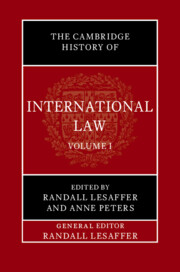Book contents
- The Cambridge History of International Law
- The Cambridge History of International Law
- Frontispiece
- The Cambridge History of International Law
- Copyright page
- Contents
- Plates
- Tables
- Contributors
- Preface
- 1 Scope, Scale and Humility in the History of International Law
- Part I The Historiography of International Law
- Part II The Historiography of International Law
- 6 The Historiography of International Law in East Asia
- 7 The Historiography of International Law in Sub-Saharan Africa
- 8 Historiography of International Law on the European Continent
- 9 The Historiography of International Law in Russia and Its Successor States
- 10 ‘The Most Neglected Province’
- 11 The View from the US Leviathan
- 12 Using History in Latin America
- Index
- Plate Section (PDF Only)
- References
7 - The Historiography of International Law in Sub-Saharan Africa
from Part II - The Historiography of International Law
Published online by Cambridge University Press: 06 December 2024
- The Cambridge History of International Law
- The Cambridge History of International Law
- Frontispiece
- The Cambridge History of International Law
- Copyright page
- Contents
- Plates
- Tables
- Contributors
- Preface
- 1 Scope, Scale and Humility in the History of International Law
- Part I The Historiography of International Law
- Part II The Historiography of International Law
- 6 The Historiography of International Law in East Asia
- 7 The Historiography of International Law in Sub-Saharan Africa
- 8 Historiography of International Law on the European Continent
- 9 The Historiography of International Law in Russia and Its Successor States
- 10 ‘The Most Neglected Province’
- 11 The View from the US Leviathan
- 12 Using History in Latin America
- Index
- Plate Section (PDF Only)
- References
Summary
This chapter discusses the overlooked and often ignored historiography of the history of international law in Africa. It argues that this absence is a symptom of the myth of African ahistoricity before the coming of European imperialism and the idea that the advent of intellectual independence only came after decolonisation. In order to overcome this exclusion scholars should abandon the disciplinary tools and markers of nineteenth- and twentieth-century Western international law that are usually employed when establishing the canon of the history of international law. Instead, the chapter proposes that pan-Africanism can offer a lens through which to view African and Black authors’ historical engagement with histories of international law on the continent. Unlike their European contemporaries, most pan-African authors were not interested in analysing detailed state practice, but had a far more ambitious project: to construct a new world order based on racial equality and self-determination. In that sense, what they were interested in was forging anew the very foundations on which international law and international relations had been built.
- Type
- Chapter
- Information
- The Cambridge History of International Law , pp. 216 - 243Publisher: Cambridge University PressPrint publication year: 2024

